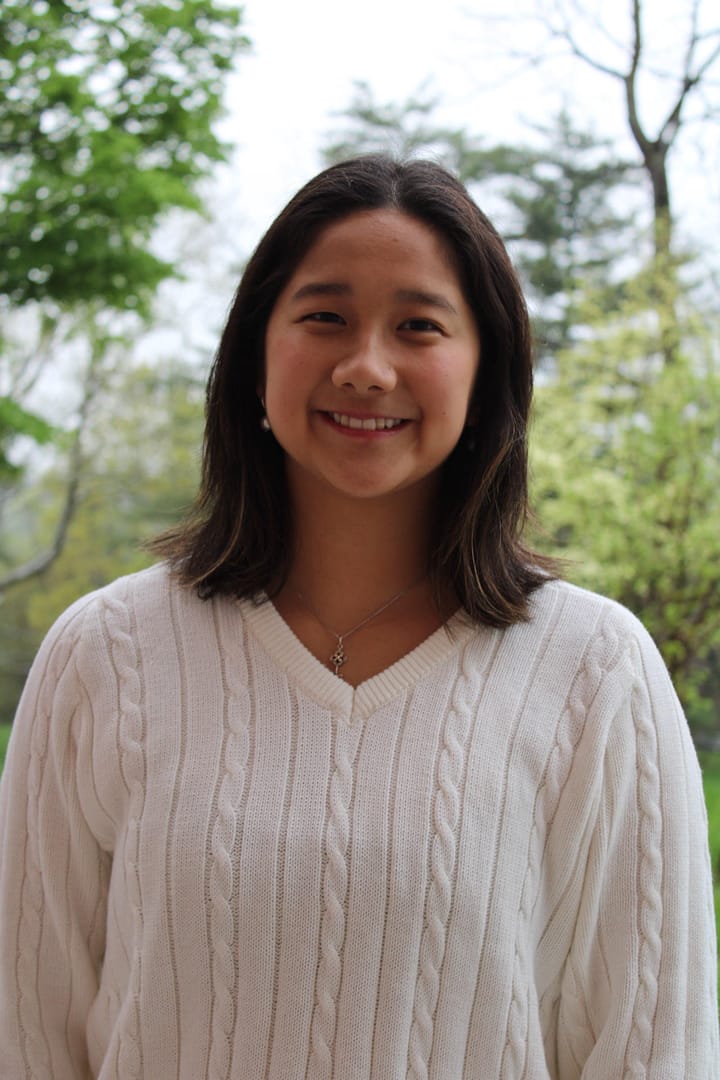Exercises in Thought: “Hauntings” / “Exorcisms in Thought”
In the final installment of their long-running column, Columnists Joe Sweeney ’25 and Tim Carroll ’25 muse on the legacy of “Exercises in Thought” and what the column has meant for them.
Sweeney: Hauntings
This is a strange time. I find it difficult to write about anything.
I feel pretty good about what I’m doing in life. This time last year, I told myself I would spend a summer diving into writing and research to figure out if English graduate school was really something I could do. I came out on the other end of that summer with an answer in the positive. In the fall, I worked with my favorite professors on application materials, burned metaphorical oil late into the nights of my Thanksgiving break to get a version of the first chapter of my thesis submitted as a writing sample, and received a couple of acceptances in January. I will begin a six-year Ph.D. program in the coming fall.
I wrote my English honors thesis on two very strange novels. I want to briefly give you an idea of the strangeness of one of them. Willa Cather’s “The Professor’s House” centers around the ruminations of Peter St. Godfrey, a middle-aged professor of history at a mid-sized university in Michigan. St. Godfrey spent the greater part of all the days of his life writing a singularly ambitious work on the Spanish explorers in America. The early volumes, in the academic establishment, made all the splash they would have if they were dropped into Lake Michigan. St. Godfrey chalks up the disregard to a misapprehension of his purposes: “Nobody saw that he was trying to do something quite different — they merely thought he was trying to do the usual thing, and had not succeeded very well.” In later publications came a growing ferment of interest in St. Godfrey’s experiment. He achieved modest fame, and modest wealth.
As you can imagine, the fame and wealth, even if they were less meager, could not mean much to a scholar like St. Godfrey. What satisfied him most was the harmonious and natural relation to his material, building out at last into inevitable design, that he enjoyed so fully in his younger days. For that loss, the rewards foisted upon him by the world are a poor ersatz. The novel, however, brings into the professor’s life a far more abundant recompense: Tom Outland, a young man who one day stumbles into the professor’s garden, searching for instruction.
Despite this rather artless arrival, the boy proves brilliant. Tom brings a shine back to life which the professor thought he had left behind; St. Godfrey spends many evenings with Tom vividly descanting on all matters of subjects. Physics and engineering prove to be Tom’s forte. After graduating from the university, he spends many late nights working at a bulkhead vacuum that will revolutionize aviation. Just as Tom finishes his work, the Great War breaks out. He leaves right away to join the fight and falls to enemy fire somewhere in Flanders.
Following the professor as he expends his energies tracing the loss of Tom and the loss of his youth, the reader arrives at the last section of the novel, about 40 pages long, titled “The Professor,” thinking they have a pretty good idea of where St. Godfrey stands — namely, in elegy season. But it turns out that the novel will not be doing the usual thing. As St. Godfrey muses further on his life, he realizes that the loss of Tom, and the loss of his youth, does not matter very much after all. He comes to conceive of his life as a kind of trivial accident; that is, not just at the juncture of this dull end, but on the whole, in all its ecstasies and passionate griefs. At once, all of it seems to him unrelated to what he was essentially supposed to do.
What was St. Godfrey supposed to do?
He has a vision of himself as a young boy in the wilds of Kansas, younger than his youth, a pre-social creature, not very cultivated, and yet terribly wise. He lives on the banks of rivers and spends his days giving names to the things he sees and touches. It is difficult to imagine how the professor could have carried this boy into the life he eventually made for himself — and yet St. Godfrey feels that there was a time when he meant to be friends with this boy for all his days, and that he did not requite that friendship, and that for this failure his life has not meant much.
These are some of the things, as a consequence, the professor finds himself saying out loud:
“He sat motionless, breathing unevenly, one dark hand lying clenched on his writing table. There must, he was repeating to himself, there must be some way in which a man who had always tried to live up to his responsibilities could, when the hour of desperation came, avoid meeting his own family.”
“In great misfortunes, he told himself, people want to be alone. They have a right to be. And the misfortunes that occur within one are the greatest. Surely the saddest thing in the world is falling out of love — if once one has ever fallen in.”
I repeat these words to myself often.
Thinking, for me, is like the friendship that St. Godfrey forsakes. It is a promise you make to talk over your ideas with some other self within yourself, who is silent and wise and kind of weird. Just as King Lear wished to be one of God’s spies alongside his beloved Cordelia, so too, in thinking, might I wish to be a secret agent for myself, taking up “the mystery of things” and whispering intelligence in the ear of someone who I can trust will not understand.
I love “The Professor’s House.” I love Willa Cather. I love Tim Carroll. I love thinking. If I feel good about going to graduate school, it is because I am convinced that there is more to life than becoming who you truly are.
Carroll: Exorcisms in Thought
At the end of this column, and at the end of my time at Amherst, I have done a fair amount of thinking. But that is not a result that gives me much pride. It rather seems like this was the only option available, and that, looking back on everything I did, it appears that I had no other choice I could reasonably make.
The beginning of thinking and of all philosophy, wonder, is best described in Plato’s dialogue “Theaetetus” and analyzed by Hannah Arendt in “The Life of the Mind” as a pathos, or passion, which is to be suffered by the subject. Maybe someone can try to be more open to the passion of wonder, and thus indirectly more open to the activity of thinking, but ultimately, it is out of one’s hands whether they are struck with wonder or not.
Accordingly, when one is struck with wonder, the thinking process is mostly out of their hands. It takes off of its own accord. Hence, my lack of pride – because under this view, this column and the thoughts within it are merely the products of my reaction to the world. Writing this column was satisfying, but only in the same way that fishing a pebble out of one’s shoe is satisfying. The thoughts expressed here simply nagged me until I found a way to exorcise them in writing. Of course I would end up writing about them. Of course I would fish the pebble out of my shoe.
In the same way, finishing my thesis was less a moment of pride and more a moment of relief — that I had finally expressed, in a semi-acceptable manner, the thought that I had wanted to. I think my thesis was fine. But writing it raised more problems with animals and the law which promise to eat away at me until I exorcise them, too. I hope I will have the opportunity to do so.
One thing which I hope this column will do is provide a glimpse into what thoughts afflicted me and Joe. I was inspired to start this column in part by reading articles from AC Voice. I liked their strong authorial style. You can really tell that students were struck by certain issues. I hope that future generations gain some joy and insight by looking into these pieces from me and Joe to fill out their views of not just what was happening in Amherst from 2023-2025, but also how those things struck us, what was front of mind.
Amherst can create an environment to foster thinking. It is less important to get lost in the weeds about how professors ensure that each claim is precisely worded and sufficiently supported. The heart of the matter is that students must be able to be struck with wonder at the world and must have opportunities to exorcise their thoughts, then reflect on their ability to do so. Here, we can entertain questions of writing craft, if a thought was worded properly. But the wondering and the thinking comes first.
Sometimes I wonder to what extent we have fixed abilities to wonder at the world. Or what is crushing our ability to wonder. And then I feel despair. Graduating from a liberal arts college means leaving a lot of wondering behind, and that is what I anticipate to be the saddest part.
I am grateful to Joe Sweeney for delivering these thoughts with me. I don’t think it could’ve been anyone else. I wouldn’t have it any other way.
Correction, May 6, 2025: An earlier version of this article mistakenly omitted edits that had been made by the author prior to publication. This article has been updated to reflect those edits.





Comments ()